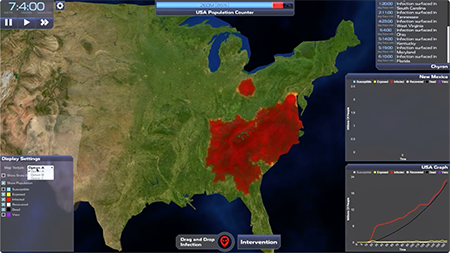
U of I Granted First
NIH Science Education
Partnership Award
to the State of Idaho
November 2, 2023For the first time since its establishment 30 years ago, the Science Education Partnership Award (SEPA) program of the National Institute of General Medical Sciences (NIGMS) of the NIH has awarded funding to a project in Idaho. The SEPA program supports innovative science, technology, engineering, and mathematics (STEM) and Informal Science Education (ISE) initiatives for Pre-K to 12th grade. U of I researchers Barrie Robison (PI) with the College of Science and Terry Soule (Co-PI) with the College of Engineering have been awarded Idaho’s first SEPA grant through their work with Polymorphic Games, U of I’s unique, interdisciplinary, STEM-based video game studio.
The project will develop an integrated educational program designed to build the systems thinking and data literacy skills necessary to understand the complex dynamics of infectious disease. Over the course of the five-year, $1.3 million SEPA award, Polymorphic Games will create and deploy inventive game-based simulations of infectious disease dynamics, providing educators with engaging and easily adopted digital tools that expand students’ systems thinking and data science literacy skills. These game-based simulations will help students to learn and understand how complex interactions within a biologic system can lead to unexpected and counter-intuitive outcomes.
The simulations will also be used for educational research through a collaboration with Roger Azevedo, a professor and director of the Laboratory for the Study of Metacognition and Advanced Learning Technologies at the University of Central Florida (UCF). Azevedo will lead the team’s efforts in testing the effectiveness of the software in improving data literacy, systems thinking, and the remediation of scientific misconceptions related to infectious disease.
"Today's students must be proficient at analyzing complex biologic systems and navigating their unpredictable outcomes," said Robison. "Infectious diseases are a great example of these types of dynamic systems. Bringing a SEPA project to Idaho is an exciting opportunity for us to help cultivate these skills and improve our students' readiness to tackle real-world challenges."
By Michelle Reagan,
IIDS Scientific Communications and Design Specialist